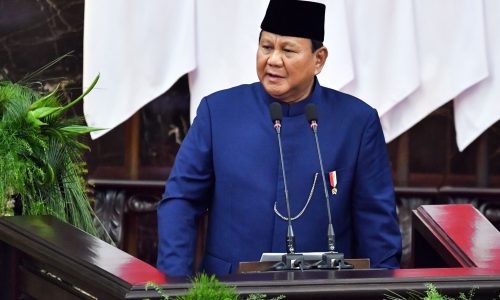Hashim S. Djojohadikusumo, Indonesia’s Special Presidential Envoy for Climate and Energy, recently expressed strong reservations about the effectiveness of the Just Energy Transition Partnership (JETP), calling it a “failed program.” At the CNBC Indonesia ESG Sustainability Forum 2025, Hashim remarked, “It has been running for two years, yet not a single dollar has been disbursed by the U.S. government. It turned out to be just empty talk.”
He further pointed out that while a clause in the agreement promised $5 billion in funding, it remained unfulfilled, stating, “Unfortunately, they are not.” This criticism has sparked concerns about Indonesia’s energy transition strategy and its alignment with global climate goals.
Concerns About Indonesia’s Commitment to the Paris Agreement
Hashim’s statement touches on broader concerns regarding Indonesia’s participation in the Paris Agreement, particularly following the U.S. withdrawal under former President Donald Trump. The ongoing debate over Indonesia’s energy policy has intensified, especially with the country’s continued reliance on coal-fired power plants (PLTU). Hashim himself cautioned that the early retirement of coal power plants could be detrimental to the Indonesian economy, describing such a move as “economic suicide.”
The approval of Indonesia’s National Energy Policy (KEN) draft, which allows coal plants to operate until 2060, raises further doubts about the country’s commitment to meeting its climate targets. The use of carbon capture technology and co-firing methods in these plants has been approved as part of the solution, but many argue that this is a step backward in terms of a true energy transition.
Impact on Indonesia’s Energy Transition and Global Standing
Indonesia’s original commitment under the Paris Agreement was to reduce emissions by 31.89% through domestic efforts and 43.2% with international support by 2030. Given that the energy sector is one of the largest sources of emissions in the country, transitioning to renewable energy and phasing out coal were crucial components of this plan. However, Hashim’s concerns about the negative economic impact of closing coal plants, coupled with the recent approval of policies supporting coal for several more decades, signal a potential reversal in Indonesia’s energy strategy.
Sholahudin Al Ayubi, Policy Strategist at CERAH, commented on the situation, urging the government to reconsider its stance. He stated, “The government’s hesitation in continuing the Paris Agreement and the possible cancellation of early coal power plant retirements should be reconsidered. Early retirement of coal power plants could actually open up better economic opportunities for Indonesia’s future, as global investment trends now favor countries with strong energy transition commitments and green energy availability.”
The Consequences of Withdrawing from the Paris Agreement
Should Indonesia choose to withdraw from the Paris Agreement, several serious consequences could follow, with potentially severe implications for its future economic and diplomatic relations:
1. Loss of International Trust
Withdrawing from the Paris Agreement could tarnish Indonesia’s credibility as a reliable global partner in climate action. This would likely strain diplomatic and trade relations, particularly with countries like those in the European Union, which are committed to upholding stringent environmental, social, and governance (ESG) standards.
2. Impact on Foreign Investments
Indonesia’s green energy transition has attracted foreign investments from countries such as Japan, Norway, Germany, and others, particularly in clean energy projects. A retreat from the Paris Agreement could deter these investments and jeopardize future partnerships, which are crucial for Indonesia’s energy transition.
Sholahudin Al Ayubi stressed the importance of the energy transition for Indonesia’s economic future, remarking, “Energy transition is not just about reducing emissions—it is also about maximizing Indonesia’s true economic potential. If we fail to act, Indonesia will fall behind in the global energy transition supply-demand race.”
3. Delayed Renewable Energy Development
Indonesia’s energy transition would be further delayed by a continued reliance on fossil fuels, especially coal. Fossil fuel subsidies in 2024 alone cost the government over $24 billion, a significant portion of which went toward electricity subsidies. According to the International Renewable Energy Agency (IRENA), a shift away from fossil fuels could save Indonesia up to $38 billion annually by 2050. This savings would come from reducing pollution and minimizing the external costs of climate change.
Sartika Nur Shalati, a Policy Strategist at CERAH, emphasized the importance of renewable energy, noting, “The cost of renewable energy transition is now 40-80% lower than a decade ago. Switching to renewable energy helps Indonesia reduce its reliance on fossil fuel subsidies, which strain the national budget, while fostering energy independence and long-term economic opportunities.”
4. Escalating Climate Crisis
Failing to meet its Paris Agreement commitments would exacerbate Indonesia’s vulnerability to the climate crisis. Key sectors such as agriculture, fisheries, and tourism, already facing pressures from climate change, would suffer even more. According to data from the Cross Dependency Initiative (XDI), Indonesia is one of the five most vulnerable countries to climate change.
Clarifying the Status of JETP Funding
The Just Energy Transition Partnership (JETP) is a collaborative initiative aimed at assisting developing countries in transitioning to low-carbon energy systems. Launched in November 2022 during the G20 Summit in Bali, JETP Indonesia is focused on mobilizing USD 20 billion over several years to help the country phase out coal power plants and expedite its energy transition. The International Partners Group (IPG) has committed USD 11.6 billion, along with USD 10 billion in private funding from seven banks within the Glasgow Financial Alliance for Net-Zero (GFANZ).
The IPG consists of countries such as Japan, the United States, Canada, Denmark, the European Union, Germany, France, Norway, Italy, and the United Kingdom. Germany currently leads the IPG.
However, it is worth noting that the JETP funding is not entirely in the form of grants, as widely discussed during the G20. It involves various financial schemes, including grants, technical assistance, equity, loans, and both bilateral and multilateral financing.
While no funds have been directly disbursed to Indonesia yet, JETP has secured USD 1.1 billion in concessional loans and USD 225 million in grants, which are being managed by designated agencies within the IPG.
According to Tempo Magazine’s research, the U.S. has pledged USD 2 billion, with USD 1 billion allocated as loan guarantees, to support Indonesia’s access to World Bank financing for energy transition projects. This agreement was signed between the U.S. and the World Bank on November 9, 2024. However, Indonesia has not yet utilized these loans, as the interest rates are higher compared to government bonds.
Furthermore, the U.S. Trade and Development Agency (USTDA) has allocated grants for feasibility studies, including a project focused on expanding renewable mini-grid networks in Indonesia’s remote areas. These studies are being carried out by tQ Automation LLC, in collaboration with the U.S. Department of Energy’s National Renewable Energy Laboratory, under the Net Zero World Initiative.









